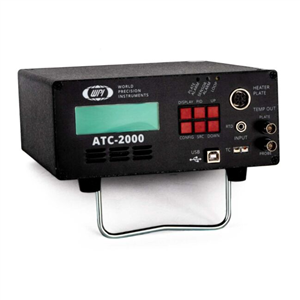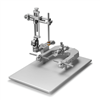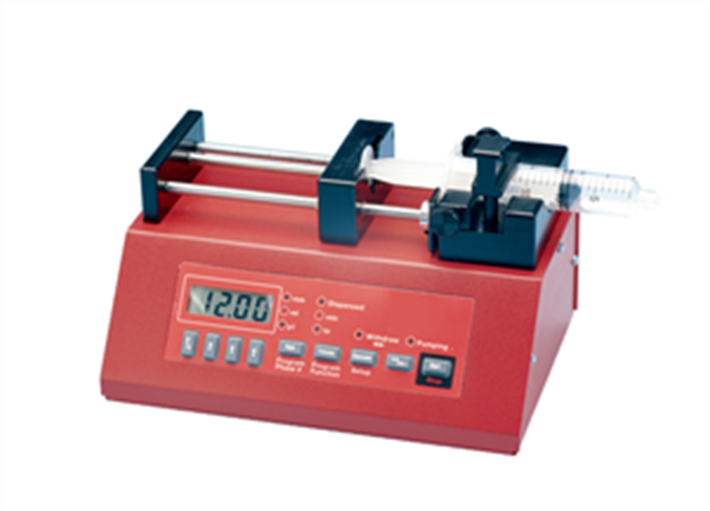

ATC2000
Animal Temperature Controller
- Overview
- Specifications
- Accessories
- Citations
- Related Products
Overview

There are 1 images available to view - click to enlarge and scroll through the product gallery.
ATC2000 Datasheet
/ Download as PDF
ATC2000 Instruction Manual
/ Download as PDF
- Animal Temperature Controller with Adaptive mode–auto adjust PID regardless of animal size
- Extremely quiet DC heater to facilitate electrophysiological recordings
- Plate's internal temperature sensor prevents localized hot spots under animal with maximum temperature stability
- Three temperature sensor inputs
- Auto shutdown if the plate reaches 45°C
- Compatible with RTD (resistive temperature device) and thermocouple probes
ATC2000 is a low noise heating system for maintaining animal body temperature during experimental procedures. The DC heater is extremely quiet in terms of electromagnetic radiation. This is essential in electrophysiological recordings which are very sensitive to electromagnetic interference.
The controller uses proportional, integral, and derivative (PID) technology in adjusting the DC voltage output. Compared with switched on/off type controllers, PID controllers provide a much more precise and stable control of temperature. The PID approach is also more immune to the variation of the experimental conditions such as change in animal size and unexpected disturbances.
The controller has three temperature sensing inputs.
- The resistive temperature device (RTD) probe input can be used to monitor an RTD rectal probe to control the animal temperature or to monitor ambient temperature, induction chamber temperature or any other temperature.
- When using a thermocouple probe, the thermocouple (TC) probe input can be used just like the RTD input. (A T type thermocouple must be used.)
- The heater plate also has an internal temperature sensor. The ATC2000 monitors this sensor to prevent the localized hot spots under animal.
The controller has three operational modes:
- Normal mode uses the configured sensor (RTD or TC) or the plate sensor to drive the control loop.
- Adaptive mode uses the temperature of the heated plate and the temperature of the subject to control. This approach is less prone to overshoot, but somewhat slower the normal mode, depending on the sampling rate used.
- Shutdown is a fail safe mode used if the plate temperature ever exceeds 45°C.
The ATC2000 is tuned at the factory. However, the PID parameters may also be set manually. The temperature resolution of the controller is 0.1°C. The rectal temperature probe has a 6-ft ultra-flexible, shielded cable and an RTD sensor.
The metal heating plates (available separately) have built-in temperature sensors. Compatible with stereotaxic systems, the rigid, flat surface fits under the U-frame. Plates are washable with water and detergent.
Required Accessories
A heating plate and a temperature probe are required for use with this unit. Please see the Accessories Tab.
Videos
5 Reasons to Choose WPI's ATC2000 Animal Temperature Controller
Understanding the ATC2000 Animal Temperature Controller Modes of Operation
How to Set the Controlled Temperature for WPI's ATC2000 Animal Temperature Controller
How to Understand the ATC2000 Display
How to Adjust the ATC2000 PID Parameters
How Does PID Control Work in an ATC2000?
How to Set the Configuration Parameters for the ATC2000
Troubleshooting WPI's ATC2000 Animal Temperature Controller
How to Reset the Factory Defaults on the ATC2000
Specifications
| Resolution | 0.1°C |
| Accuracy | ±0.3°C |
| Rat Sensor | RTD Ø 2.0 mm tube with 3.5mm ball head |
| Maximum DC Output | 10V, 3A |
| Temperature range | Up to 45°C |
| Power | Universal AC adapter 90-264V Input, 12V@4.5A maximum output |
| Dimensions | 45 x 30 x 7cm |
| Weight | 11 lb. (5kg) |
REQUIRED Accessories (select one sensor and one plate)
7363-4 Enzol enzymatic detergent, gallon
7364-4 Cidex Plus biocide, gallon
300443 RTD Extension Cable, 3 m
61800 Heating Plate with built-in RTD sensor, 15x25cm
61830 Heating Plate with built-in RTD sensor, 15x10cm
61840 Heating Plate with built-in RTD sensor, 15x4cm
61824 Mouse Rectal Temperature Probe, 1.0mm shaft diameter, 2.0mm ball tip
503573 Silicone pad for ATC2000 (10x15cm)
Accessories
503573
SILICONE PAD, 10X15 CM. Heat conductive rubber pad used on top the ATC1000 metal warmin...
61800
Medium Heating Plate w/ built-in RTD sensor, 25x15cm. For use with the ATC2000.
61830
Small Heating Plate w/ built-in RTD sensor, 10x15cm. For use with the ATC2000.
61824
RTD Rat Rectal Temperature Probe, 1.2mm shaft diameter, 2.5mm ball tip. For use with...
61840
X-Small Heating Plate with built-in RTD sensor, 15x4cm. For use with the ATC2000.
Citations
Happel, M., Deliano, M., & Ohl, F. (2015). Combined Shuttle-Box Training with Electrophysiological Cortex Recording and Stimulation as a Tool to Study Perception and Learning. JoVE (Journal of Visualized. Retrieved from https://www.jove.com/video/53002/combined-shuttle-box-training-with-electrophysiological-cortex
Haberl, M., Ginger, M., & Frick, A. (2017). Dual anterograde and retrograde viral tracing of reciprocal connectivity. Synapse Development: Methods and. Retrieved from http://link.springer.com/protocol/10.1007/978-1-4939-6688-2_21
Miranda, A., Roque, S., Serre-Miranda, C., Pêgo, J. M., & Correia-Pinto, J. (2017). Inflammatory response and long-term behavioral assessment after neonatal CO2-pneumothorax: study in a rodent model. Journal of Pediatric Surgery. http://doi.org/10.1016/J.JPEDSURG.2017.08.016
Okun, M., Lak, A., Carandini, M., & Harris, K. D. (2016). Long Term Recordings with Immobile Silicon Probes in the Mouse Cortex. PLOS ONE, 11(3), e0151180. http://doi.org/10.1371/journal.pone.0151180
Miranda, A., Roque, S., Pêgo, J. M., & Correia-Pinto, J. (2018). Neurodevelopment impact of CO2-pneumoperitoneum in neonates: experimental study in a rat model. The Journal of Surgical Research, 221, 293–303. http://doi.org/10.1016/j.jss.2017.09.014
Gonzalez, E., & Grill, W. (2017). The effects of neuromodulation in a novel obese-prone rat model of detrusor underactivity. American Journal of Physiology-. Retrieved from http://ajprenal.physiology.org/content/early/2017/06/19/ajprenal.00242.2017.abstract












Request
Catalogue
Chat
Print